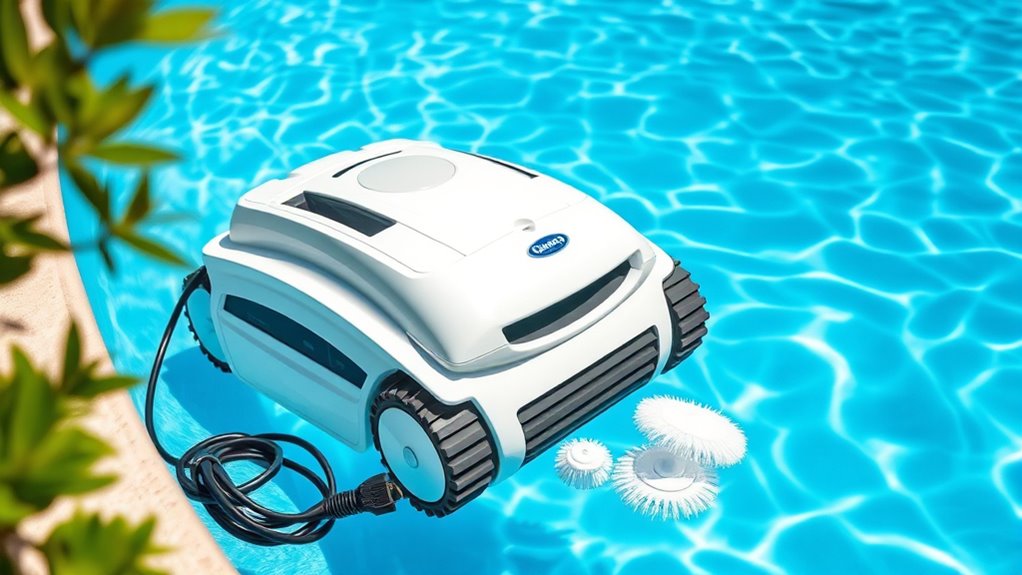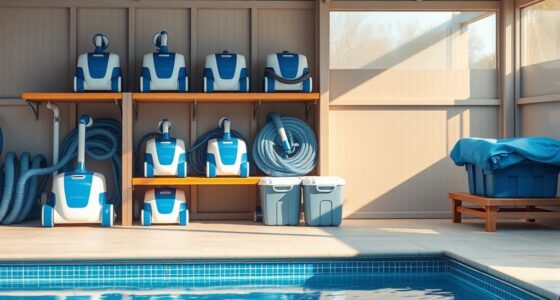To pick the best automatic pool cleaner, start by evaluating your pool’s size, shape, and surface to choose the right type—robotic, suction-side, or pressure-side. Consider features like navigation, filter quality, and ease of use, matching them to your cleaning needs. Budget wisely and think about long-term costs like maintenance and repairs. If you want to find the perfect fit, keep exploring how each factor influences performance and value.
Key Takeaways
- Assess your pool’s size, shape, and depth to determine the most suitable cleaner type and features.
- Choose between robotic, suction-side, or pressure-side cleaners based on your pool’s specific needs.
- Consider cleaning features like navigation, filter quality, and surface compatibility for thorough and efficient cleaning.
- Ensure compatibility with your pool’s shape, size, and surface, and prioritize user-friendly controls for ease of use.
- Balance initial costs with long-term maintenance, warranty coverage, and energy efficiency for cost-effective operation.
Assessing Your Pool’s Size and Shape
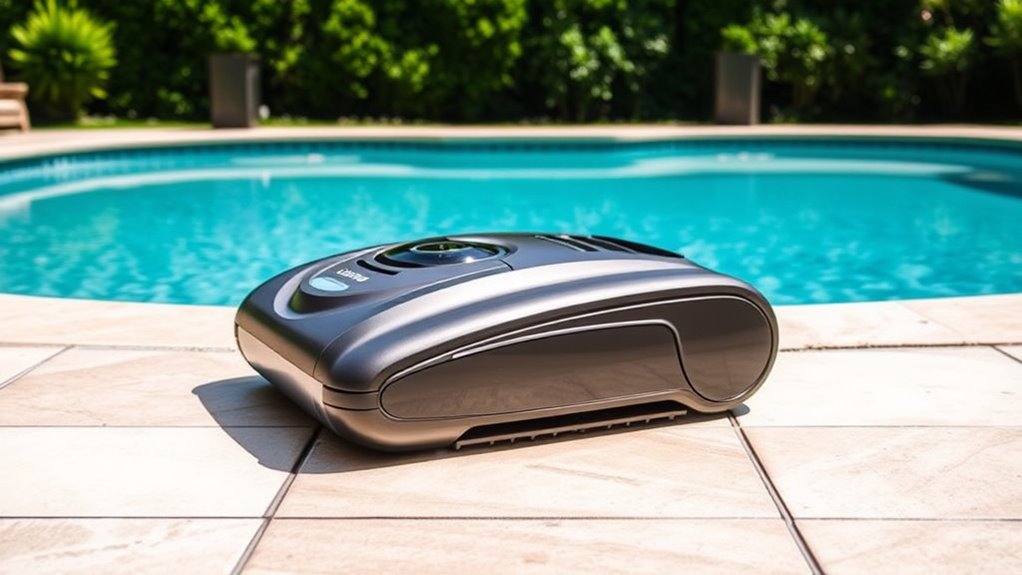
Have you considered how your pool’s size and shape will influence your choice of an automatic cleaner? Larger pools or irregular shapes require more powerful or versatile models to cover every area effectively. The pool’s depth also matters because deeper sections might need cleaners with adjustable suction or longer reach capabilities. Additionally, water chemistry impacts cleaner performance; certain models handle algae and mineral buildup better, especially in pools with varying depths. Knowing your pool’s dimensions helps determine whether a robotic, suction-side, or pressure-side cleaner fits best. For complex shapes, you’ll want a cleaner with navigation features that adapt to curves and corners. Properly understanding your pool’s size and shape ensures you select a model that provides thorough cleaning and extends the lifespan of your equipment. Considering the type of debris your pool frequently accumulates can also help you choose a cleaner with the appropriate filtration system. Moreover, assessing the ease of maintenance of the cleaner can save you time and effort in the long run. Additionally, understanding the pool’s layout can help you decide on a cleaner with specific navigation capabilities.
Understanding Different Types of Pool Cleaners
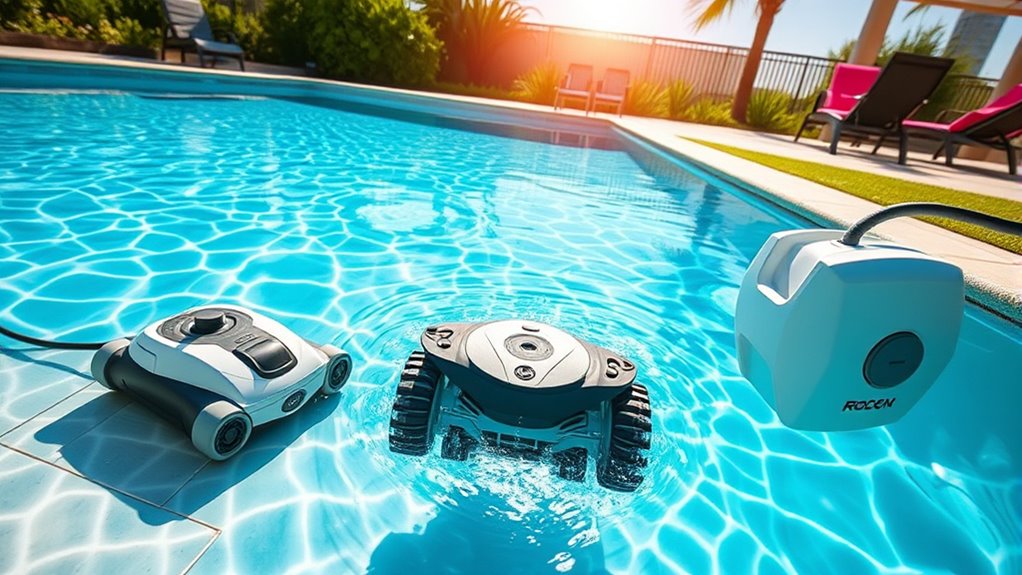
Choosing the right automatic pool cleaner begins with understanding the different types available. Robotic cleaners are known for their high robotic efficiency, steering your pool independently and thoroughly cleaning floors and walls. They typically have adjustable suction power, allowing you to target stubborn debris and ensure a deep clean. Suction-side cleaners, on the other hand, attach to your pool’s skimmer or dedicated suction line, using your pool’s existing pump to power their cleaning. These are generally more affordable but rely heavily on your pump’s suction power, which can affect their performance. Pressure-side cleaners use dedicated jets powered by your pool’s pump, providing stronger suction for larger debris. Each type offers distinct advantages, so understanding their differences helps you choose the best fit for your pool’s needs. Additionally, considering the factors influencing performance can help you make a more informed decision tailored to your pool’s specific requirements. Understanding how contrast ratio impacts image quality can also guide your choice if you plan to use a projector for poolside entertainment or outdoor movie nights. To optimize cleaning effectiveness, evaluating the size and shape of your pool can significantly influence which cleaner will perform best. Moreover, paying attention to user reviews and brand reputation can provide insights into the durability and reliability of different models.
Evaluating Cleaning Features and Performance
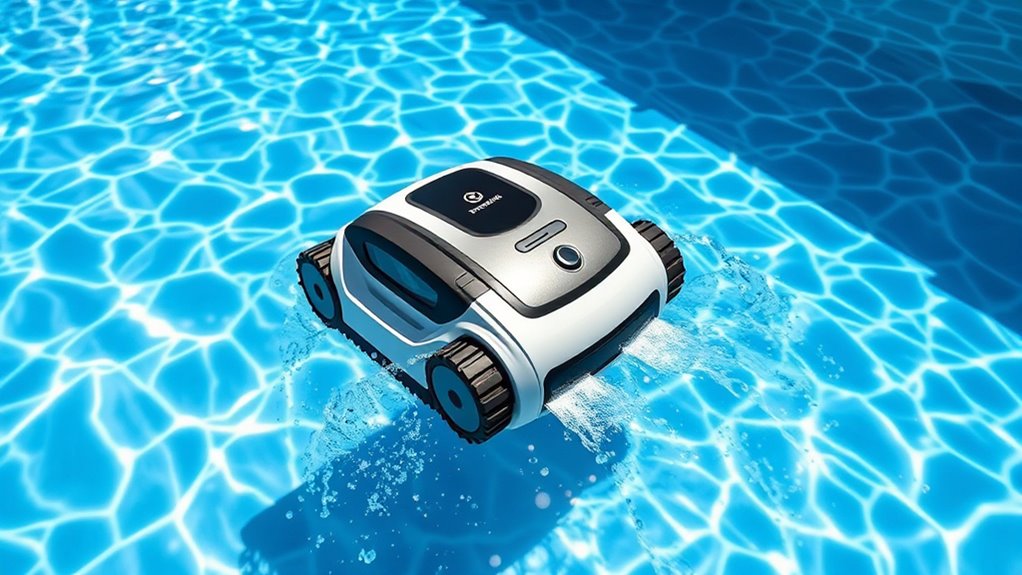
When evaluating automatic pool cleaners, paying close attention to their cleaning features and performance is essential to guarantee you get the best results. Robotic navigation is critical, as it determines how thoroughly the cleaner covers your pool. Look for models with advanced navigation systems that can efficiently map and clean every corner without missing spots. Filter efficiency is also key; a good cleaner should have a high-quality filter that traps dirt, debris, and algae effectively, reducing the need for manual cleaning and improving water clarity. Consider how well the cleaner handles different surfaces and debris sizes. A device with strong cleaning capabilities will save you time and energy, ensuring your pool stays pristine with minimal effort on your part. Additionally, understanding the technology used in heat pumps can help you choose energy-efficient systems for maintaining water temperature, reducing overall energy costs, and some models incorporate smart features that enable better control and scheduling via mobile apps. Being aware of filter types and efficiencies can also help you select a cleaner that maintains optimal water quality over time. Moreover, selecting a cleaner with durable materials ensures longevity and consistent performance in various pool conditions. Incorporating advanced cleaning algorithms can further enhance the thoroughness and efficiency of your pool maintenance.
Considering Compatibility and Ease of Use
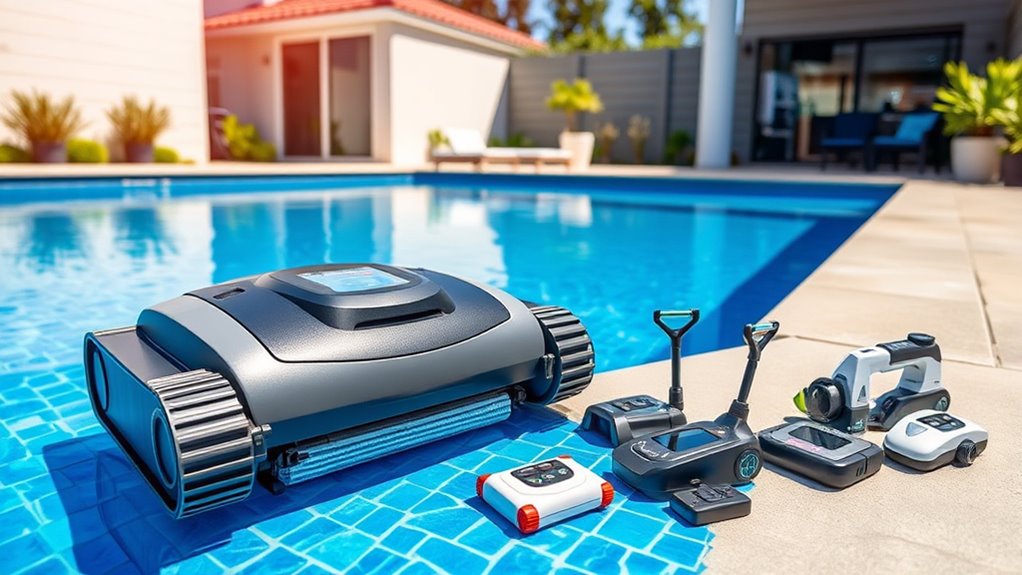
Ensuring your automatic pool cleaner is compatible with your pool setup is essential for hassle-free operation. Consider smart navigation features that adapt to your pool’s shape, reducing cleaning time and missed spots. Battery life also matters; longer-lasting batteries mean more thorough cleaning without frequent recharges. Compatibility includes checking if the cleaner suits your pool’s size, shape, and surface type. Ease of use involves simple controls and straightforward setup, so you spend less time troubleshooting.
| Feature | Benefit |
|---|---|
| Smart navigation | Efficient cleaning, less manual intervention |
| Battery life | Longer cleaning sessions, fewer charges |
| Compatibility | Fits your pool’s dimensions and surfaces |
| Ease of use | User-friendly controls and installation |
Budgeting and Long-term Maintenance Costs
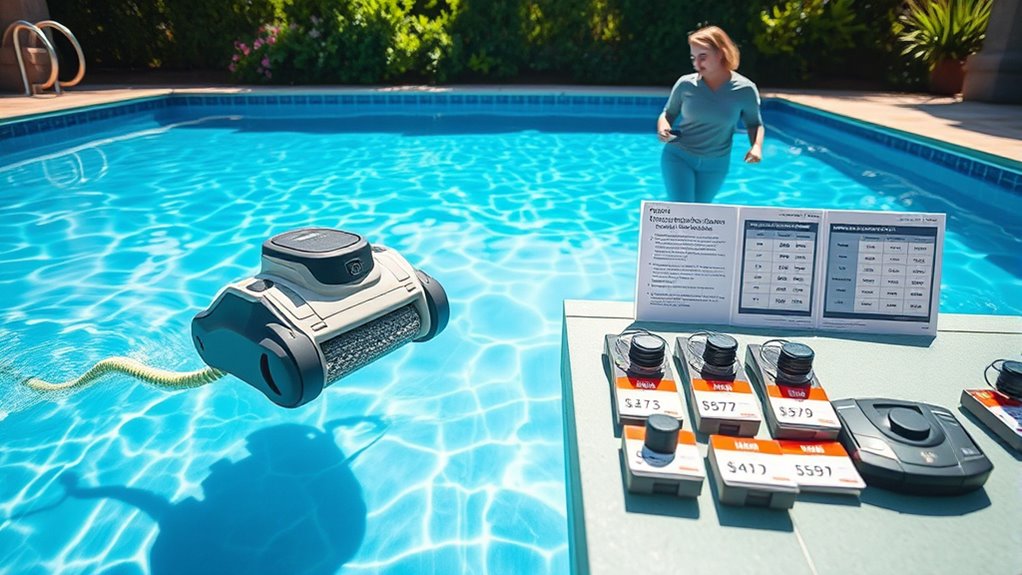
Budgeting for an automatic pool cleaner involves more than just the initial purchase price; you also need to contemplate long-term maintenance costs. The key is understanding the cost versus value, ensuring you’re investing in a durable, efficient model that minimizes ongoing expenses. Look into warranty coverage, as it can save you money on repairs and parts over time. Cheaper options may seem appealing upfront, but they often lack the reliability and support of higher-quality models. Consider the cleaner’s energy efficiency, filter replacement frequency, and overall lifespan. Additionally, evaluating how sound healing science can contribute to your overall well-being might inspire you to choose a model that operates quietly and reduces noise pollution. Some models also feature advanced noise reduction technology, which can significantly enhance your poolside experience. In fact, choosing a high-quality model with these features can lead to fewer repairs and replacements, saving money in the long run. Moreover, assessing the availability of customer support and service is crucial to ensure assistance if issues arise. By comparing these factors, you’ll make a smarter choice that balances initial affordability with long-term savings, ensuring your pool stays clean without unexpected expenses draining your budget.
Frequently Asked Questions
How Often Should I Run My Automatic Pool Cleaner?
You should run your automatic pool cleaner based on your maintenance schedule and cleaning frequency needs. Typically, running it 2-3 times a week keeps your pool clear and clean. Adjust the schedule if you notice more debris or algae buildup. Regular use prevents dirt from settling, reduces chemical use, and keeps your pool inviting. Consistency is key to maintaining a healthy, sparkling pool with minimal effort.
Can I Use a Robotic Cleaner in a Saltwater Pool?
Yes, you can typically use a robotic cleaner in a saltwater pool. Just check the robotic compatibility with saltwater maintenance, as some models are designed specifically for salt systems. Look for robotic cleaners with corrosion-resistant parts and proper sealing. By choosing a compatible robotic cleaner, you’ll ensure efficient cleaning without damaging your equipment, keeping your saltwater pool sparkling clean and well-maintained.
What’S the Average Lifespan of an Automatic Pool Cleaner?
Ever wonder how long your automatic pool cleaner will last? The average lifespan varies, but with proper pool maintenance and regular cleaning frequency, you can expect it to run smoothly for about 5 to 7 years. Neglecting maintenance can cut that time short. To maximize your cleaner’s life, keep it clean, check brushes and filters often, and follow manufacturer advice—your pool will thank you with sparkling, hassle-free swims.
Do Automatic Cleaners Work Effectively on Pool Stairs and Corners?
Automatic pool cleaners can work effectively on pool stairs and corners, especially models with specialized features. Look for cleaners with advanced corner navigation and dedicated pool stair cleaning capabilities. These features help the cleaner maneuver precisely around steps and tight corners, ensuring thorough cleaning. Keep in mind that some models perform better on stairs and corners than others, so choose one with proven navigation to keep every part of your pool spotless.
Are There Eco-Friendly or Energy-Efficient Automatic Pool Cleaners Available?
You might wonder if eco-friendly options or energy-efficient models exist. The good news is, many automatic pool cleaners now feature eco-friendly options, using less power and reducing chemical use. Look for energy-efficient models with low power consumption and environmentally conscious designs. These cleaners work just as effectively on pool floors, stairs, and corners, helping you save on energy costs while keeping your pool clean and green.
Conclusion
Choosing the right automatic pool cleaner depends on your pool’s size, shape, and your cleaning needs. By understanding the options and features available, you can find a device that’s both effective and easy to use. Remember, a penny saved is a penny earned, so consider long-term costs as well. When you make an informed choice, you’ll enjoy a sparkling pool without breaking the bank or your back.
